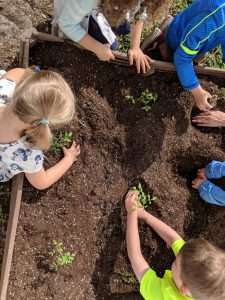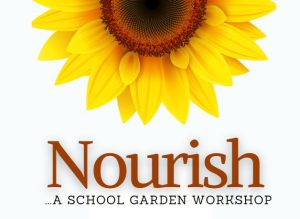Nourishment, a common thread woven through school gardens, and for many it is the reason to have them.
Why would teachers have a school garden? After all, for some- it adds another responsibility, to an already full plate. It can require time in a day that doesn’t seem to have enough minutes to spare. And while Florida garden seasons align well with a school calendar- it can be uncomfortable work opening or closing a garden while heading in and out of summer. So I grew curious as to what makes the teachers willing to go above and beyond and provide school gardens for their students to enjoy. So I asked the why of their school gardening, and was humbled by their feedback. Their responses were insightful and reflect the efforts and intention these dedicated folks imbue in their gardens and the students that enjoy them.
One teacher running a parenting garden said, “It is a great experience for the girls to understand life and growth. Things take time and how we care for things in our life will result in how they grow and turn out.” After all, a school garden is different than visiting a nature park in that students are expected and encouraged to interact with the plants and in the space, and to take agency in learning about the garden and caring for it. Students can make observations over time, learn firsthand about cause and effect, problem-solving, and so much more, all in a school garden. They can learn about what nourishes the plants and how to provide that. In return they gain nourishment from the harvest the plants provide to them. As a local teacher says, “The students LOVE taking care of their garden and then eating the fruits of their labor.”

Some teachers use the school garden to provide students with physical activity, sunshine, and time interacting with nature:
“To get outside and play in the dirt with the added benefit of growing beautiful food.”
“Because we love growing plants along with being outdoors.”
“So children can experience the joys & beauty of nature growing in food & flowers.”
Some teachers expanded on the benefits of a school garden by noting how it fosters a connection that can be nourishing for students, beyond the fresh food and physicality. The words connect and nurture appeared often in the ‘why’ of their school gardens. One site uses their garden as a “healing garden for students whose families struggle with drugs, alcohol, and abuse.” This reminded me of a visit I made to see a school garden teacher a few short years ago. She welcomed me with the warmest hug, and shared stories of how fellow teachers would send her students that needed time in the school garden. Time for respite while struggling with the loss of a parent, or simply needing to decompress from the sensory overload of their day. I teared up then and now -knowing what teachers and students may be tackling in their everyday lives, and I feel incredibly humbled to have any part in helping their efforts to provide these special places for students. I encounter some of the most kind and giving people through school gardens… teachers, volunteers, and students.
Beyond the nurturing of the physical and mental wellness of people, school gardens can be places to enjoy biodiversity. Just as the students nourish the plants, the plants nourish the students- they also offer nourishment for other forms of life- like earthworms, pollinators, and all sorts of insects. I fondly remember being at planting activities and noticing how quickly students could transition from an “Ewww!” response when encountering a bug, to an “Oooh!” exclamation of wonder. It wasn’t anything I did, it was simply the opportunity to hear their classmates remarking on what they noticed and observed about the bug that opened their eyes and mind to the idea that maybe the bug wasn’t just something ‘gross’, but something interesting and maybe it was present in the garden for a reason. In a school garden students get a close-up view of a place teeming with a variety of life and they are allowed and encouraged to conscientiously interact and learn from these experiences.
A school garden is a place kids can enjoy being curious and have that natural feeling spark wonder and interest in learning. I remember meeting a third grader during a school garden planting activity at a suburban school. While we were digging in the soil to plant seedlings- he remarked he had never dug in soil before. We were in the suburbs in a place abundant with parks, but he had never been presented with opportunity or reason to dig and discover in dirt. Something valuable like soil -that can be teeming with life- may simply devolve as only a place to walk or pave over – when there isn’t opportunity to interact with it and learn its value. When it comes to food security and biodiversity- soil matters. https://edis.ifas.ufl.edu/publication/AE572
Fortunately, with a school garden, a dedicated teacher may share “about the Earth and environment and that everything is interconnected. To show them where fruits and veggies come from,” as many kids only experience of food is that it comes from a grocery store. Another teacher echoes this sentiment of sustainability and adds their hope that a school garden will nourish career exploration into agriculture. “I teach gardening with the hope that kids will in turn teach their families how to be more sustainable AND with the hope that some will enter the ever-expanding field of agriculture.” It is economically important that younger generations have some exposure to agriculture so they can decide if they would like to be one of the 21 million people engaged in non-traditional agriculture careers. As many of these careers require advanced degrees- early exposure provides students with time to steer into that career path if they discover an interest. https://www.fdacs.gov/Education/Preparing-for-Careers-in-Agriculture Time in a school garden can still have academic benefits for students not pursuing agricultural careers as multiple studies cite improved test scores for garden participants. https://extension.uga.edu/programs-services/school-garden-resources/research-publications/academic-performance.html
So many reasons why teachers and volunteers put forth time and effort into their school gardens, but there is a central thread…nourishment. Students nourishing plants and receiving it in return when eating fresh veggies grown in their garden. Plants and soil nourishing the bugs and butterflies. Teachers using school gardens to nourish in students a sense of wonder and a joy of learning, to spark an interest in a future career, or nourish the well-being of those students navigating difficult times.
Nourish, a school garden workshop on Feb. 11, 2023
It may come as no surprise that this common thread inspired the creation of our next school garden workshop:“Nourish: a school garden workshop focused on what nourishes your plants, your students, and you.”
If you are a teacher or volunteer engaged with a school garden or seeking to become involved with them, please register to enjoy this free half-day workshop located at our local UF/IFAS Sarasota County Extension office at Twin Lakes Park, on Saturday, Feb. 11 from 12:30-4:30. Some components are hands on so registration is required, but free. Certificates of attendance will be provided at the end of the workshop. If you have questions about the workshop please email mhanak@scgov.net
‘Nourish’ school garden shareable flyer with registration QR code
‘Nourish’ school garden workshop agenda
Does your garden need a little nourishment and funds are low? There are some open grants you may want to explore along with additional learning opportunities.
- Grants and more:
- There is a 2023 GroMoreGood Grassroots Grant open and listed here: https://kidsgardening.org/grant-opportunities/
- Florida Agriculture in the Classroom has grants available to help rebuild agriculture projects damaged by recent hurricanes. Only school gardens and agriculture projects that were established before the storms are eligible. The grant application period will close February 15, 2023. Complete the grant application at https://faitc.org/hurricane-relief-grants/. If you have any questions, please email Becky Sponholtz at sponholtz@agtag.org.
- Scholarships to attend National Ag in the Classroom may be available. More information found here: https://agclassroom.org/teacher/grants/ The annual national conference will be in Orlando this year. How awesome is that?
- Free Florida Farm to School conference in March in Howey-in-the-Hills, FL https://farmtoschoolfl.com/
Source: UF/IFAS Pest Alert
Note: All images and contents are the property of UF/IFAS.




